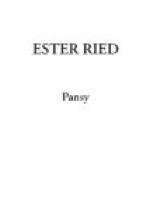“Do you know, dear Ester, there must have been two new joys in heaven to-day? First they had a new-comer among those who walk with him in white, for they are worthy; and then they had that shout of triumph over another soul for whom Satan has struggled fiercely and whom he has forever lost.” This said Abbie, as they nestled close together that evening in the “purple twilight.”
And Ester answered simply and softly: Amen.
CHAPTER XIX.
SUNDRIES.
Meanwhile the days moved on; the time fixed for Ester’s return home had long passed, and yet she tarried in New York. Abbie clung to her, wanted her for various reasons; and the unselfish, pitying mother, far away, full of tender sympathy for the stricken bride, smothered a sigh of weariness, buried in her heart the thought of her own need of her eldest daughter’s presence and help, and wrote a long, loving letter, jointly to the daughter and niece, wherein she gave her full consent to Ester’s remaining away, so long as she could be a comfort to her cousin.
Two items worthy of record occurred during these days. The first time the family gathered at the dinner table, after the one who had been so nearly a son of the house had been carried to his rest in that wonderful and treasured city of Greenwood, Ralph, being helped by John, as usual, to his glass of wine, refused it with a short, sharp, almost angry “No. Take it away and never offer me the accursed stuff again. We should have had him with us to-day but for that. I’ll never touch another drop of it as long as I live.”
Which startling words Mr. and Mrs. Ried listened to without comment, other than a half-frightened look bestowed on Abbie, to see how she would bear this mention of her dead; and she bore it this way. Turning her eyes, glistening with tears, full on her brother’s face, she said, with a little quiver of tender gladness in her voice:
“Oh, Ralph, I knew it had a silver lining, but I did not think God would let me see it so soon.”
Then Mr. and Mrs. Ried concluded that both their children were queer, and that they did not understand them. The other item was productive of a dissertation on propriety from Mrs. Ried.
Ralph and his father were in the back parlor, the former standing with one arm resting on the mantel while he talked with his father, who was half buried in a great easy chair—that easy chair in his own elegant parlor, and his handsome son standing before him in that graceful attitude, were Mr. Ried’s synonyms for perfect satisfaction; and his face took on a little frown of disappointment, as the door opened somewhat noisily, and Mrs. Ried came in wearing a look expressive of thoroughly-defined vexation. Ralph paused in the midst of his sentence, and wheeled forward a second easy chair for his mother, then returned to his former position and waited patiently for the gathered frown to break into words, which event instantly occurred.




